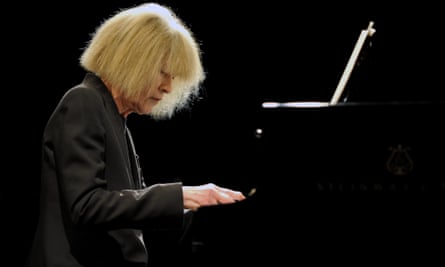Carla Bley, the American jazz composer-pianist celebrated for boldly avant-garde work as well as her uplifting and beautiful takes on the genre’s mainstream, has died aged 87.
Her death was announced by longtime partner and musical collaborator Steve Swallow, who said the cause was complications from brain cancer.
Bley’s impish, blithe yet pointed approach to her craft meant she recorded right across the jazz spectrum, from straightforwardly lovely piano pieces (the likes of Lawns became standards and hits on streaming services) to stridently political big band works and an acclaimed 1973 triple-LP jazz-rock opera, Escalator Over the Hill, with a supporting cast including country-pop singer Linda Ronstadt, Cream bassist Jack Bruce and Manfred Mann’s Paul Jones.
Born Lovella May Borg in Oakland, California in 1936, she learned piano from the age of three but dropped out of school at 14 and picked up work as a pianist in Bay Area jazz clubs. Bley then moved to New York aged 17 and worked as a cigarette girl at jazz club Birdland, later saying: “I was the one who took a picture of you and your girlfriend at the table to commemorate your being there with someone who wasn’t your wife usually. I hardly sold anything because I was listening to the music,” which included Miles Davis, John Coltrane, Count Basie and more.
She met pianist Paul Bley, marrying him in 1957 and moving back to California together, with Bley composing music for him and an LA group to improvise off of, its members including Ornette Coleman and Don Cherry.
The Bleys returned to New York, and Carla became deeply involved in the city’s free jazz scene: “I wanted to object to as many things as possible that were wrong in the world of jazz and change the whole system that existed in the music world,” she later explained.
She was a key component of the Jazz Composer’s Orchestra and its associated Guild, a union who campaigned on behalf of musicians’ working conditions. Equally politically minded was the Liberation Music Orchestra, helmed by bassist Charlie Haden who was inspired by Spanish civil war songs, Che Guevara and more – Bley was the group’s arranger and conductor, with Rolling Stone magazine’s Lester Bangs hailing her “miracles of dynamics” in a review of their self-titled 1970 album.
Having had her head turned by the Beatles, Bley also explored a fusion with pop and rock. As well as recording Escalator Over the Hill across five years with around 50 personnel, she wrote the music for the debut album by Pink Floyd’s Nick Mason and collaborated with Robert Wyatt. Having amicably divorced Bley (and kept his name), she also made a number of 1970s collaborations with second husband, trumpeter Michael Mantler; the couple also had a daughter, Karen.
She continued to reconnect with Haden’s Liberation Music Orchestra (and helmed it after his death in 2014) and worked with her own self-titled big band. She released a steady stream of solo releases with German label ECM from the late 1970s onwards, culminating in a trio of albums with Swallow and saxophonist Andy Sheppard, most recently Life Goes On in 2020.
She was diagnosed with brain cancer in 2018, explaining: “Sometimes I don’t know the answer to a question, so I think they must have taken something out by mistake, because ever since the operation I no longer have perfect pitch.”

